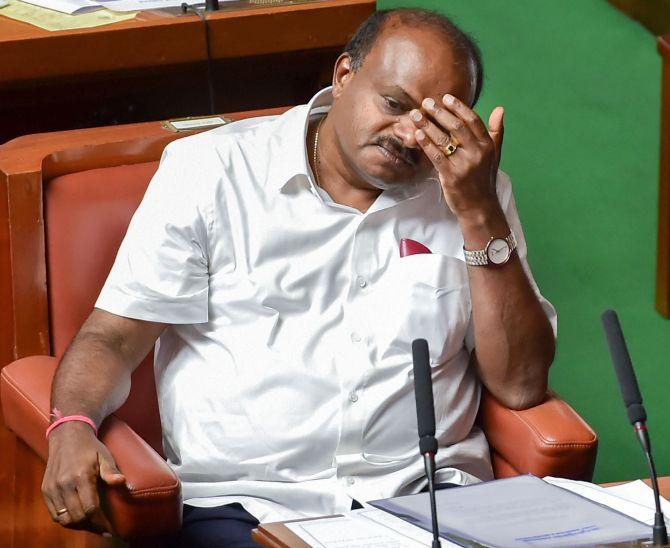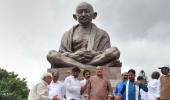'Deep down, it betrays a transactional view of politics. That, to get, the voter must give,' argues Krishna Prasad.

An interesting distraction to indulge in, online, is to type the words 'kumaraswamy cries', with the quote marks, in the window of a search engine.
In about 0.3 seconds, it will generate over 6,000 entries, most of them from the last 12 months.
Among the links that pop up are, 'Kumaraswamy cries in public meeting, says "not happy"' and 'Kumaraswamy cries, says he has "swallowed poison"'.
Whether it is helping a differently abled girl, receiving a felicitation, or lamenting his plight, the Karnataka chief minister's default emotion has been to crank up his lacrimal gland, so much so that a cartoon shows him drowning in his own tears in 2019.
As that prospect looms, will anybody shed a tear were he to go, later if not sooner?
As it happens, modern media seeks an answer even when it is blazingly obvious. So, shortly after the Congress-Janata Dal-Secular government checked in 2018, Kumaraswamy found himself in the position of having to explain why his eyes welled up.
'I cried because I am a sensitive man, a sentimental person,' he told a TV interlocutor: 'I have some pain in my mind, inside my heart. My pain is, why some sections of the people have not accepted me as CM, why some sections of the media have not accepted my government?'
After a lacklustre year, that situation has not changed, but deteriorated to a daily joke. And, even if he isn't sniffing into his towel as much, non-acceptance is Kumaraswamy's leit motif.
Craving acceptance is an epidemic among millennials tethered to the smartphone. 'Likes', 'shares' and 'follows' are the elixir of their existence, and there are some who have bid goodbye to the real world following their failure to win approval in the virtual one.
But Kumaraswamy is 60. He lords over the badlands of realpolitik, not social media. In his mother tongue, Kannada, there is a borderline sexist adage that you should not trust a woman who laughs too much -- or a man who cries too much.
Yet, HDK who began playing acceptance as an emotional card, graduated to using it as a political alibi. How much carry can it have when the electorate refused to lump Rahul Gandhi's 'power is poison' pill?
There are three distinct phases of Kumaraswamy's teary-eyed thirst for voters's trust. Before the 2018 assembly election, it was grounded in sympathy.
'If you want to see me alive, vote for me' was a blunt appeal he made on the final day of campaigning, referring to his somewhat fragile health. It didn't work; the JD-S got but 38 seats in a House of 224.
After the verdict, it advertised itself as self-pity. 'I desired to become CM not to show off, but to finish my father's unfinished agenda, to solve the problems of the land. Somehow, the people of the state did not have faith in me that I will deliver,' he told party workers, describing himself as a 'child of circumstances'.
But it is the verdict of the 2019 general election, in which Kumaraswamy's son and father were roundly defeated and his nephew fetched the JD-S its lone seat, that has given his unrequited quest for approval the edge of anger bordering on contempt.
'You vote for Narendra Modi in the elections and you come to me to solve your problem?' he hollered out to protesting workers who blocked a bus he was travelling in last week.
The charitable view to take is that the beleaguered CM, at once battling the BJP's efforts to dislodge him and the Congress attempts to pull the rug, had lost his cool in the heat of the summer moment.
But, deep down, it betrays a transactional view of politics. That, to get, the voter must give.
In that sense, Kumaraswamy's latest outburst is the aggravation of a phantom wound. On more than one occasion since becoming CM a second time, he has wailed that he could not do much because voters had not voted for his party.
'The people of North Karnataka want development, but don't vote for us,' he said in July last year. And in March this year, he dubbed voters of coastal Karnataka as 'not intelligent' because they only voted the BJP.
'I am at the mercy of the Congress and not the 6.5 crore people of Karnataka' has been his refrain. On the face of it, of course, he is right.
Had the Congress not decided to play second fiddle to the JD-S, despite its 78 MLAs, there was no way he would have become CM a second time.
But now that he was, was he the CM of just those who had elected his party, or also of those who had voted its coalition partner, or of the entire electorate, regardless of their political persuasion?
It can be argued that a politician is well within his right to vent against voters who turn against them. Kumaraswamy's predecessor Siddaramaiah, for example, has sought to know why people voted for the BJP in the Lok Sabha elections although it was the Congress government that introduced a slew of welfare schemes.
'It is we who gave free rice to the poor, free milk and shoes to students. It is we who waived farm loans, gave incentives to milk producers. Yet you vote the BJP?' But that is sophistry that calls into account the role of gratitude in an electoral process, and whether voters vote differently in state and national elections.
If the 2018 Karnataka assembly election was about the state government's performance, voters had clearly turned away from the Congress in a third of the seats it held.
On the other hand, when the Lok Sabha election were held, the Congress-JD-S coalition had been in power a year.
But that's not the point. The point is whether a government can serve only those who voted for the ruling party, or hold it against those who didn't.
In 2014, at the height of the so-called 'Modi wave', the BJP won a 31% voteshare in an 80% Hindu nation. Five years on, it stands at 37%. By Kumaraswamy's yardstick, is the Narendra Damodardas Modi government answerable only to a third of India's 125 crore population or only half the Hindus, or does the argument not hold water because it has managed to come to power on its own, unlikely the JD-S?
The fact that despite its 303 seats, the BJP-led NDA has had to add 'Sabka Vishwas' to its motto underscores the fallacy of the Kumaraswamy school of thought.
Possibly, Kumaraswamy dreamt of the glory days of the Janata Dal of yore. In 1994, it won 115 seats with a voteshare of 33.5%. Since then, its voteshare climbed steadily downwards, to settle around the 18% to 20% mark in the last four assembly elections.
Its performance in 2018 was no different from 2008, although that came a year after his first shot at chief ministership.
To invert the argument, Kumaraswamy's father H D Deve Gowda became prime minister in 1996 when the Janata Dal had won just 16 of the 543 seats in the Lok Sabha. Did that make Deve Gowda any less of a PM because 527 constituencies hadn't even considered his party?
Inherent in the Kumaraswamy line of thinking are the seeds of second-class citizenship. That those who didn't vote for a ruling party (or coalition) belong to the other side, and therefore deserve what they get.
Maneka Gandhi articulated this rather too bluntly when she told Muslim voters in Sultanpur that it was best they voted for her if they wanted their work done after the elections. Maybe they did, maybe they didn't, but look where that statement landed her in Modi 2.0.
Joyless because he didn't receive the full mandate the JD-S had sought, who will tell Kumaraswamy that when Rajiv Gandhi bagged 413 seats in 1984, more than 50 per cent of the country had voted against the Congress?
Krishna Prasad is former editor-in-chief, Outlook, and former member, Press Council of India.










